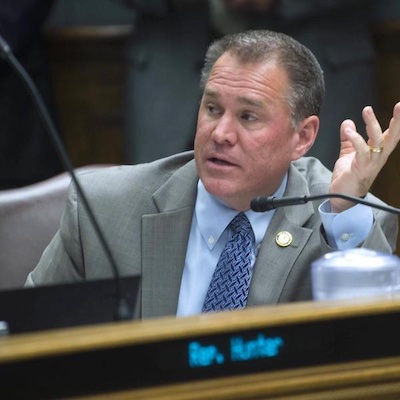Jim Beam column:Two bad bills have surfaced
Published 6:15 am Wednesday, April 30, 2025

- Louisiana state Sen. Alan Seabaugh, R-Shreveport, has one of two bad bills that have surfaced during the state's current legislative session.(Photo courtesy of The Advocate).
Every session of the Louisiana Legislature — regular or special — has a good number of bad bills. Luckily, most are defeated but some get through.
Thankfully, one of the worst bills in the current session was defeated in committee last week with a 7-7 vote. The authors and supporters of both measures said they have no connection to the four amendments defeated on March 29, but opponents aren’t buying that argument.
House Bill 200 by Rep. Dixon McMakin, R-Baton Rouge, was sidetracked by the House and Governmental Affairs Committee. The Advocate reported that McMakin said he wouldn’t attempt to revive his legislation.
McMakin wanted to add an unbelievable number of members to the East Baton Rouge Parish Republican Executive Committee. Former state Rep. Woody Jenkins chairs that committee and in an interview he said Gov. Jeff Landry pushed for passage of McMakin’s bill to punish Jenkins for campaigning against the four amendments.
Jenkins said doubling the GOP executive committee’s membership would lead to his ouster as parish party chairman.
A spokesperson for Gov. Landry said he was unaware of McMakin’s bill, although Derek Babcock, the state GOP party chair, said he told the governor during an interview two days earlier he would oppose McMakin’s bill and that the two men had agreed to disagree over the measure.
The newspaper said during 90 minutes of tart debate and questioning “a parade of fellow Baton Rouge Republicans repeatedly told him (McMakin) Wednesday he had committed the egregious sin of wanting state government to meddle in the business of the GOP governing authority in East Baton Rouge Parish.”
Babcock told the committee, “Political parties are private groups” and “have the right to establish their own internal rules. State control over committee elections is not necessary.”
Senate Bill 74 by Sen. Alan Seabaugh, R-Shreveport, is the other bad bill. It was amended to say if district attorneys approve, they could move criminal cases with 15- and 16-year-old defendants from juvenile jurisdictions to adult courts.
Those juveniles would still be tried under the juvenile legal code, not the adult code. The original bill automatically moved all those cases to adult courts. The Senate Judiciary C Committee voted 6-1 to send the bill to the full Senate.
The Louisiana Illuminator reported that state Attorney General Liz Murrill wants state lawmakers to pass Seabaugh’s bill “a few weeks after Louisiana overwhelmingly voted down a constitutional amendment that could have led to similar teenage transfers in the criminal justice system.”
Seabaugh, like McMakin, said his bill isn’t a response to the amendment because he planned to file his bill before voters rejected the amendment. That reminds me of the old saying, “If you believe that, I have a bridge in Brooklyn to sell you.”
Opponents of Seabaugh’s legislation offered some excellent reasons why it’s a terrible idea. Some said it would throw four of the state’s largest court systems — in Orleans, Jefferson, East Baton Rouge and Caddo parishes — into chaos. They have juvenile courts with judges who solely handle cases involving people under age 17.
Paul Young, a retired Caddo Parish juvenile court judge, said, “Children are not simply tiny adults that you can handle in adult criminal court.”
Critics say the public sent a clear message on moving minors into the adult system when 66% of them rejected an amendment doing the same thing.
The Illuminator said there is broad consensus that rehabilitation provided in the juvenile system — as opposed to punishment provided in adult prisons — is especially effective for teenagers because their brains haven’t fully developed yet.
Jay Dixon, a former state public defender in Louisiana who now works in Massachusetts, said, “There are tons of studies that show that is the worst thing you can do and all it does is create another generation of criminals.”
Some critics say district courts are already overwhelmed by their current workloads. Young said moving juveniles into those courts would cause severe scheduling challenges.
The Advocate called the defeat of the four constitutional amendments on March 29 “Landry’s biggest political defeat as governor to date.” It’s long past time for Landry, Murrill, Seabaugh, McMakin and others who are upset over that defeat to get over it. The voters have made it clear how they feel about handling juveniles in the court system.
Jim Beam, the retired editor of the American Press, has covered people and politics for more than six decades. Contact him at 337-515-8871 or jim.beam.press@gmail.com.
| ReplyForward
Add reaction |





